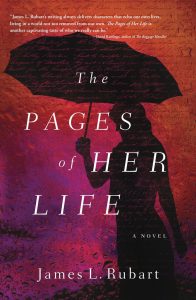by James L. Rubart, @jameslrubart

Last year I taught at a number of virtual writing conferences, and one of the questions I was asked has stuck with me.
“How many rejections before you decide it’s best to put the MS away and move on?”
I think it’s an important question and thought you might be interested in how I responded.
I told her, “The number is 14.75.”
After that? Start your next manuscript, shove the old one in the drawer and forget about it forever.
Wait. Maybe it’s 16.3 rejections. Or 100. Or nine.
The truth is, it depends. (I know, you hear that a lot in the pub world.) But that is the reality.
There are legendary stories of bestselling books being turned down myriad times before getting picked up. (Dr. Seuss was rejected by 27 publishers before the 28th saw the genius. Chicken Soup for the Soul racked up 144 rejections. That’s one rejection a month, for twelve years.)
But I’d say those anecdotes are far and away the exception. So while I don’t think there’s a hard and fast number, there are guidelines.

Guidelines to Keep in Mind When Deciding to Dump Your Manuscript or Hang On
- Are you getting detailed feedback on your manuscript from editors and/or agents? If yes, it means they see the possibilities and it’s probably strong enough to stick with (as long as you don’t need major revisions).
- Have you been told by published authors that your manuscript needs work, but it’s only a few revisions and polishes here and there from being really, really good? Then it’s probably a few revisions and polishes here and there away from being really, really good and being ready to be published.
- Is it your first manuscript? This is the “tough love” guideline. Most (not all, but the vast majority) of writers need write a book in order to learn to write a book. Let’s say you want to put on a seven-course meal for 200 people. Unless you have a significant history of this kind of hosting, the first go will be a bit rough. But the second? Way better. The fifth, sixth, seventh banquet? Yeah, sign me up every time.
I’ve known writers who bring the same manuscript to conferences year after year after year when they should let it go for good and move on to their next story. And if you’re so in love with the story you just can’t, then at least let it go for a time.
Come back to it after you’ve written six or seven other novels.
You work on it with that much experience I promise your taste buds will end up thanking you profusely.

How Do You Stand Up for Yourself When It Means Losing Everything? Allison Moore is making it. Barely. The Seattle architecture firm she started with her best friend is struggling, but at least they’re free from the games played by the corporate world. She’s gotten over her divorce. And while her dad’s recent passing is tough, their relationship had never been easy. Then the bomb drops. Her dad was living a secret life and left her mom in massive debt. As Allison scrambles to help her mom find a way out, she’s given a journal, anonymously, during a visit to her favorite coffee shop. The pressure to rescue her mom mounts, and Allison pours her fears and heartache into the journal. But then the unexplainable happens. The words in the journal, her words, begin to disappear. And new ones fill the empty spaces—words that force her to look at everything she knows about herself in a new light. Ignoring those words could cost her everything . . . but so could embracing them.

James L. Rubart is 28 years old, but lives trapped inside an older man’s body. He thinks he’s still young enough to water ski like a madman and dirt bike with his two grown sons. He’s the best-selling, Christy BOOK of the YEAR, CAROL, INSPY, and RT Book Reviews award winning author of ten novels and loves to send readers on journeys they’ll remember months after they finish one of his stories. He’s also a branding expert, audiobook narrator, co-host of the Novel Marketing podcast, and co-founder with his son, Taylor, of the Rubart Writing Academy. He lives with his amazing wife on a small lake in Washington state.